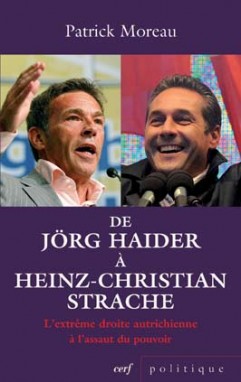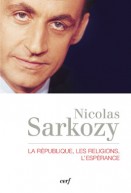
De Jörg Haider à Heinz-Christian Strache
Collection Cerf Politique
640 pages - févr. 2012
31,90€
Né en 1950 en Haute-Autriche, Jörg Haider est devenu, à partir de 1986, le leader charismatique et flamboyant, à l'allure de playboy, d'un parti de nostalgiques du IIIe Reich, le FPÖ. Il a su se bâtir une image de Robin des bois moderne, d'avocat des intérêts du « peuple » et des petites gens. À partir de 1995, Haider a donné à cette formation un profil idéologique antieuropéen, anti-immigrés et antisystème. Ses dérapages sémantiques faisant des camps de concentration des « camps de travail », ses dithyrambes à la gloire de « la génération du Front » — en particulier de la SS — ont fait scandale. Avec 27% des suffrages lors des élections de 1999, le FPÖ est entré dans un gouvernement d'alliance avec le parti conservateur, entre 2000 et 2006, ce qui a même mené la Communauté européenne au bord d'une crise internationale. La scission du FPÖ, en 2005, et surtout la mort de Jörg Haider dans un spectaculaire accident de voiture, le 11 octobre 2008, pouvaient laisser croire que l'extrême droite entrerait en décomposition. Pourtant les obsèques quasi nationales réservées à Haider ont montré la profondeur de l'ancrage populiste dans une partie de la population. Ce qui est aujourd'hui confirmé par la montée en puissance d'un nouveau leader charismatique du FPÖ, Heinz-Christian Strache, qui pourrait accéder au pouvoir en 2012. Dans cet ouvrage, Patrick Moreau aborde de manière approfondie l'histoire du phénomène populiste de droite le plus spectaculaire de ces vingt dernières années en Europe. Il soulève le problème de l'attitude des forces de la droite traditionnelle à l'égard de ces partis populistes, qui a, entre autres, dominé la scène politique française depuis deux décennies en raison de la présence récurrente du Front national de Jean-Marie et de Marine Le Pen.
--
Born in 1950 in Upper Austria, at the age of 36 Jörg Haider became the charismatic and flamboyant leader – with his ‘playboy’ allure – of a party steeped in nostalgia of the 3rd Reich, the FPÖ. He managed to cast himself in the role of a modern-day Robin Hood, defender of the interests of the ‘people’ and the most humble. From 1995, Haider gave that party an anti-European, anti-immigrant and anti-system ideological profile. His semantic gaffes turned the concentration camps into ‘labour camps’, and his panegyrics to the glory of the ‘generation of the Front’ — especially the SS — caused scandal. With 27% of votes in the elections of 1999, the FPÖ entered into a government in alliance with the conservative party between 2000 and 2006, which led the European Community to the brink of an international crisis. The fracture of the FPÖ in 2005, and especially the death of Jörg Haider in a spectacular car accident on October 11, 2008, could persuade us that the extreme right would collapse. Yet Haider’s quasi-national funeral showed how deeply populism was rooted in a part of the population. All of which is confirmed today by the rise in power of a new charismatic leader of the FPÖ: Heinz-Christian Strache, who could very well be elected to power in 2012. In this book, Patrick Moreau gives an in-depth analysis of the history of the most spectacular right-wing populist phenomenon of these last twenty years in Europe. He raises the problem of what attitude the traditional right should adopt toward this type of party, which has, among others, dominated the French political arena for twenty years in the recurrent presence of Jean-Marie Le Pen and Marine Le Pen’s Front national.
--
Born in 1950 in Upper Austria, at the age of 36 Jörg Haider became the charismatic and flamboyant leader – with his ‘playboy’ allure – of a party steeped in nostalgia of the 3rd Reich, the FPÖ. He managed to cast himself in the role of a modern-day Robin Hood, defender of the interests of the ‘people’ and the most humble. From 1995, Haider gave that party an anti-European, anti-immigrant and anti-system ideological profile. His semantic gaffes turned the concentration camps into ‘labour camps’, and his panegyrics to the glory of the ‘generation of the Front’ — especially the SS — caused scandal. With 27% of votes in the elections of 1999, the FPÖ entered into a government in alliance with the conservative party between 2000 and 2006, which led the European Community to the brink of an international crisis. The fracture of the FPÖ in 2005, and especially the death of Jörg Haider in a spectacular car accident on October 11, 2008, could persuade us that the extreme right would collapse. Yet Haider’s quasi-national funeral showed how deeply populism was rooted in a part of the population. All of which is confirmed today by the rise in power of a new charismatic leader of the FPÖ: Heinz-Christian Strache, who could very well be elected to power in 2012. In this book, Patrick Moreau gives an in-depth analysis of the history of the most spectacular right-wing populist phenomenon of these last twenty years in Europe. He raises the problem of what attitude the traditional right should adopt toward this type of party, which has, among others, dominated the French political arena for twenty years in the recurrent presence of Jean-Marie Le Pen and Marine Le Pen’s Front national.
- Dimensions : 135x215x30
- ISBN : 9782204096706
- Poids : 750 grammes


